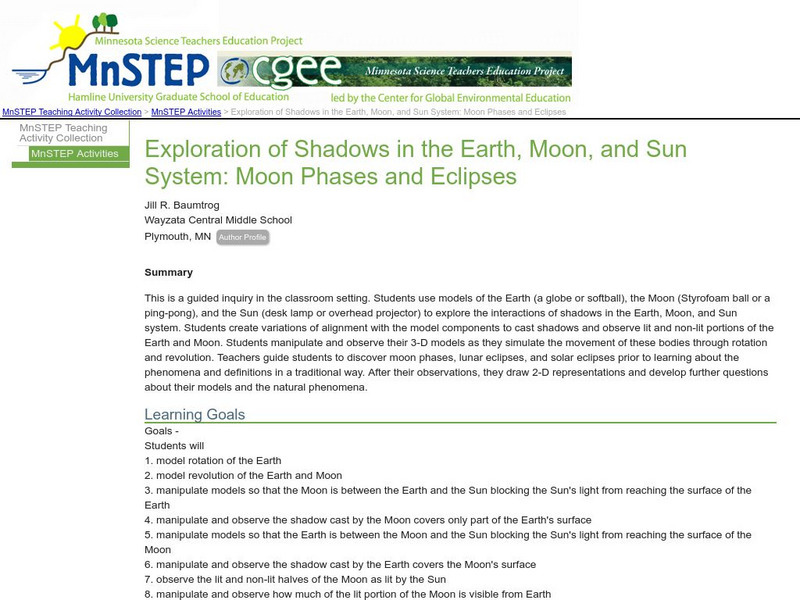Hi, what do you want to do?
Curated OER
Look on the Bright Side!
Students explore solar eclipses by participating in a number of hands-on activities. In class, students work in teams using tennis balls, grapes and flashlights to model partial and total solar eclipses.
Curated OER
A Moon with a View
Third graders explore the rotation of Earth and the moon. In this solar system lesson, 3rd graders participate in an Earth and moon simulation in which part of the class "becomes" the sun, while other children represent the moon by...
Curated OER
Moon Glow
Students identify the Earth-Moon relationship and the phases of the Moon. They participate in an activity that illustrates why the Moon has so many different looks within a lunar cycle. They discuss solar and lunar eclipses.
Curated OER
Exploring the Night Sky: Fall/Winter
Students explain how moon phases occur. They explain three ways that the night sky has been used through history. Students locate some of the constellations in the night sky. They discuss stories and myths surrounding stars.
Curated OER
Key Science Words
In this science worksheet, students find the words that are related to the common science terms. The answers are found using the links at the bottom of the page.
Curated OER
Phases of the Moon
Students determine the phases of the moon. They observe experiments to formulate explanations for moon phases. Students identify waxing crescent, waning gibbous, and the causes of the phases.
Curated OER
The Phases of the Moon
Students sketch the different phases of the moon after exploring them on an internet program. In this moon phases lesson plan, students discuss how the Sun, Earth, and Moon are related.
Curated OER
Exploring the Night Sky: Summer
Students explain how moon phases occur. They describe and explain at least two common misconceptions that people have about the moon. Students explain what a star is. They explain 3 ways that the night sky has been used throughout history.
Curated OER
Earth is Round?
Third graders discuss how Aristotle concluded that the Earth was round. As a class, they review theories about the Earth's shape and describe how life on Earth would be different if it were flat. Individually, they make a moon book in...
Curated OER
Extensions - Astronomy Review Unit
Middle schoolers participate in a review unit in Astronomy using the Layered Curriculum. This allows them to take charge of the type of assessment that is given. The method also allows better differentiation of instruction to occur.
Curated OER
"Space" Investigations
Sixth graders understand the patterns of change observable on Earth as a result of the movement of the different bodies in the solar system. They identify the physical characteristics of the different components of the solar system.
Curated OER
The Moon is made of Cheese
Eighth graders explore the reasons why they believe scientific ideas are true. They think critically rather than accept everything they are told without question.
Science Education Resource Center at Carleton College
Serc: Exploration of Shadows: Earth, Moon, Sun System: Moon Phases Eclipses
A guided inquiry where students participate in the simulation of moon phases and eclipses.
Michigan Reach Out
Reach Out michigan.org: Phases of the Moon
This site explains the phases of the moon and an easy way to remember waxing and waning. Students have to explain a given phase to their classmates with a model.


















